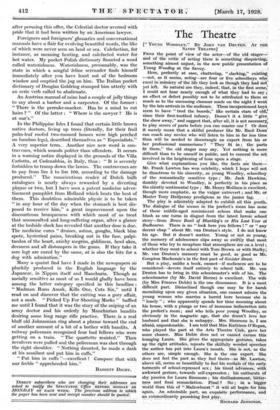The Theatre
r` YOUNG WOODLEY." By JOHN 14N DRUTEN.. AT THE. SAVOY THEATRE] FROM the point of view of the actor—of the old stager--: and of the critic of eating there is something disquieting; something almost unjust, in the now public presentation of
Young Woodley at the Savoy. -
Here, perfectly at ease, chattering, "slacking," existing —not, as it seems, acting—are four or five schoolboys who' excel in mimicry of the life they look as though they had not yet left. So natural are they, indeed-, that, in the first scene; I could not hear nearly. enough of what they had to say ; an effect or defect possibly not to be attributed to them so:. much as to the unceasing clamour made on the night I went by the late arrivals in the audienee. These inexperienced boys seem to have "trod the boards," like certain stars of since their first-toothed infancy. Doesn't it a little "give, the show away," and suggest that, after all, it is not necessaryi to play scores of parts before you can master one ? Or does, it merely mean that a skilful producer like Mr. Basil Dean can coach any novice who will listen to him in far less time than will be needed to disentangle an expert from his or her professional mannerisms "They fit in ; the parts fit them," the old stager may say. Yet nothing is more difficult than to be oneself in public, and to conceal the art involved in the heightening of tone upon a stage. ,
Give what explanations you like, the facts are there— Mr. Frank Lawton has won celebrity, which I hope will not. _ be disastrous to his sincerity, as young Woodley, schoolboy of the romantically sensitive type ;. Mr. Jack Hawkins; dumbly devoted to Woodley, is perfectly in his place as the silently_ sentimental type ; Mr. Henry Mollison is excellent, though more emphatic, as the vulgar extrovert ; and Mr. or Master Tony Halfpenny prodigious as the junior fag. , The play is " admirably adapted to exhibit all this ,youth,
The dialogue of the .seenes in the prefect's room has nonè. of those middle-aged reminiscent echoes that make one blush as one turns in disgust from the latest heroic school story—from Brave Basil of Blankleks or His Last Year at Budbourne. There is no "look here you fellows I " or "any decent chap" about Mr. van Druten's style. I do not know his age. But it doesn't matter. young or not so young, the memory of adolescence slips away so swiftly that most of • those who try to recapture that atmosphere are on a level; whether they went to school with Tom Brown or with Stalky; Mr. van. Druten's memory must be good, is. good as -Mr. Corripton Mackenzie's in the first part of Sinister' Street.
But a play, unlike a book, cannot-4f audiences are to be considered—devote itself entirely to school talk. Mr. van Druten has to bring in this schoolmaster's wife of his. The schoolmaster (by Mr. David Horne) is excellent. The wife (by Miss Frances Doble) is the one dissonance. It is a most difficult part. Disinelined though One may be for harsh moralizing upon any given situation, one Cannot admire the young woman who marries a horrid bore because she is " lonely " ; who apparently spends her time mooning about his house, with a plunge or two of immense indiscretion into the prefect's room ; and who tells poOr young Woodley, sO obviously in the magnetic age, that she dOeSn't love her husband and that she is unhappy. Mrs. Simmons is, I am afraid, unpardonable. I am told that Miss Kathleen O'Regan, who Played the part at the Arts Theatre Club, gave her some chance. Miss Doble does not or cannot eiduse this lounging Laura. She givesthe appropriate gestures, takes up the right attitudes, "repeats the skilfully ivoided Skeehei the author has put into Laura's mouth. She is not, as the others are, simple enough. She is the one expert. She does not feel the part. as -they feel theirs—as Mr. Lawton; above all, seems so beautifully to feel his recitals of the early. torments of school-repressed sex ; his timid. advances,' With awkward gesture, towards self-expression ; his outbursts of shy passion for Laura Simmons;' his disillusionment, bitter- ness and final renunciation. Final ? No.; in a bigger world than this of " Mallowlnirst " it will all begin for him again. An admirable part, an exquisite performance, and an extraordinarily proinising -finiit play.
_ . _ . _ _ _
RICHARD JENNINGS.










































 Previous page
Previous page